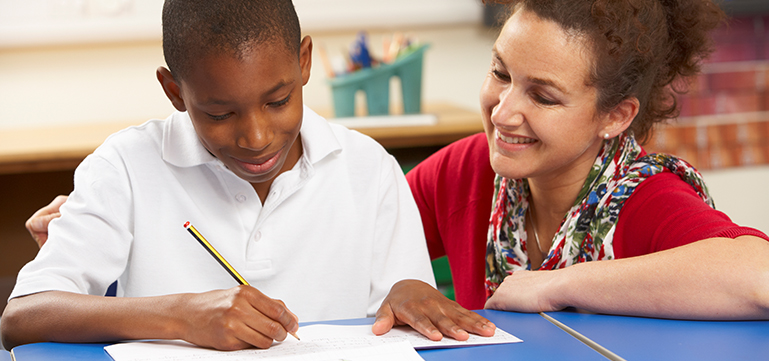Developing pupils’ skills across the curriculum

Quick links:
Context
Cwmfelinfach Primary School is in the village of Cwmfelinfach near Caerphilly and has 210 pupils on roll.
There are seven single-age classes, including a part-time nursery. The school identifies a few pupils as having additional learning needs. A few pupils are eligible for free school meals. A very few pupils come from ethnic minority or mixed backgrounds and none speak Welsh at home.
Stage 1: Evaluating the current curriculum within wider self-evaluation arrangements – developing an enriched curriculum
The school began its curriculum review by carrying out an audit of staff expertise to identify if teachers had the necessary skills to deliver activities to engage the pupils more successfully. This helped leaders to identify relevant and worthwhile professional development training.
Following the introduction of the literacy and numeracy framework (LNF), staff were keen to adapt curriculum provision to focus more clearly on the development of pupils’ skills across the curriculum. Staff reviewed each activity to link with LNF statements and planned each session to ensure that they covered skills at a suitable level for all pupils in that group. In the first year, planning involved seven members of staff delivering a range of activities, including German, cookery, art and knitting. As these activities developed, the school used them as an opportunity to increase pupils’ involvement with their local community. For example, a local forest warden ran forest school activities for the pupils and members of the Cwmfelinfach Allotment Society worked with pupils to develop their own allotments. The school organised pupils into mixed groups of pupils from Year 3 to Year 6, and arranged for the sessions to run on a six-week timetable for 90 minutes.
Stage 2: Planning and preparing for change
Following the evaluation of the curriculum, senior leaders ensure that the school collaborates more effectively with pupils, parents and the wider community to implement changes to its provision. Staff view curriculum development as an ongoing process rather than a single event. Staff meetings focus clearly on continually reviewing and modifying provision to ensure the best outcomes for pupils. Rigorous, evidence-based, self-evaluation procedures support this process. The school works collaboratively with a nearby school, other schools in the cluster and across the consortium to observe and share good practice, to create an imaginative and engaging curriculum that places the community at the heart of pupils’ learning.
Preparing to implement the Digital Competence Framework
As a result of its self-evaluation work, the school has recognised a need to update the planning and provision for the development of pupils’ ICT skills. The school’s ICT co-ordinator works closely with staff to ensure consistency of approach and continuity and progression in the development of pupils’ ICT skills. Governors have also deployed an existing member of staff to teach specific ICT skills during teachers’ planning, preparation and assessment time. This member of staff works alongside classroom teachers to ensure that they have the ability to develop pupils’ ICT skills in all areas of the curriculum. In addition, pupils acting as ‘digital leaders’ support their peers in the transfer of skills from ICT sessions to cross curricular work.
In addition, the ICT co-ordinator works with staff and pupils to develop a vision for developing pupils’ digital skills across the curriculum. As staff become familiar with the requirements of the Digital Competence Framework, they employ a wider range of strategies to raise pupils’ awareness and integrate its requirements into lessons. Teachers integrate learning objectives from the Framework in their planning and share these with pupils. Staff work with pupils to create displays in communal areas that celebrate pupils’ ICT work. The school has revised its enriched curriculum sessions to include the development of pupils’ digital skills. For example, pupils develop their understanding of coding with simple programmable toys and robotic arms, and they use gaming consoles to create buildings in virtual worlds.
The school places a strong emphasis on developing pupils’ awareness of themselves as digital citizens. Pupils use their knowledge to support peers to be safe users of the internet and electronic communication. Pupils use an online system to share and celebrate their work with parents and they collaborate with schools across the world through the internet.
Pupils carry out an audit of their own ICT skills in the autumn term and assess themselves as the year progresses to track their progress. Teachers collate evidence of pupils’ use of ICT skills across the curriculum in class folders that demonstrate coverage and progression. The school has developed a spreadsheet to track the development of pupils’ skills against the requirements of the Digital Competence Framework. This helps staff to plan effective lessons to consolidate and practise pupils’ digital skills.
The ICT co-ordinator has created a clear monitoring, evaluation and review cycle. She listens to learners to understand pupils’ attitudes towards their digital learning and evaluate their individual skills. The school places a strong emphasis on pupil voice through its ‘learning spy’ groups. This involves pupils carrying out learning walks and monitoring books with a specific focus on pupils’ ICT skills. Monitoring outcomes are shared with senior leaders, staff and governors through regular impact reports. These inform school improvement actions and changes to provision.